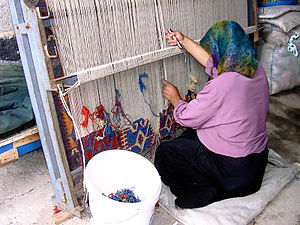
Image via Wikipedia
The old woman continued her weaving. Her slender, gnarled fingers deftly moved along the loom, positioning threads and locking them in place. She studied her handiwork for several seconds before speaking to the younger man who stood behind her. “What’s on your mind, Jeffrey?”
“You make the most beautiful tapestries, Grandmother.”
“Thank you. I’ve had many years to practice.”
“And yet, it takes you so long to finish a single one.”
The woman frowned and her hand paused in its work. “Good craftsmanship takes time and patience, Dear.”
“Perhaps. But there are machines that would allow you to work faster, Grandmother.”
“And those machines would rob me of the joy I find in my work. Working faster would be a poor substitute for the care and love I put into each tapestry.”
“But working faster would mean having more tapestries to sell.”
The woman sighed and turned to face the forty year old man. She noted that he was still in the dress pants and shirt that his job required, though he had taken off the tie and jacket. “And that would mean more money.” She smiled as his pale face flushed at her words. “Yes, I thought you might be coming to that. It usually does with you.”
“Grandmother-“
“No, Jeffrey,” she said in a soft, firm tone. “Listen to your old grandmother. You are a good man. You’re smart, and your business sense has provided much for our family. For that, I am proud of you.
“But sometimes you seem to only think in terms of money. And for that, I feel sorry for you. Because some things are more important than money. And my weaving is one of those things.
“You’re right. I could buy machines that could help me produce a single tapestry in a few days, rather than the weeks it now takes me. And if I was doing this for the money, it would make perfect sense to do exactly that.
“But I don’t do this for the money. I have money enough as it is – as hard as it may be for you to believe that. Instead, I weave for the love of weaving.
“When I weave, I create something beautiful, as you already noted. I create it thread by thread and row by row. Each move I make is an act of love and creation, a chance to pour another ounce of my soul into each tapestry. That’s something I cherish. It’s something that the money from a thousand machine-produced tapestries could never buy. And I’m not willing to give that up just to collect money I don’t need. It’s too high a price to pay.”
“But what of the things you could buy? Things that would make your life easier? More comfortable?”
“An easy life is overrated, as are excess comforts. I have comforts enough. Any more would make me value my life less, I imagine.”
“Are you saying I have it too easy, then?”
“That’s not for me to say, Dear. I’m merely saying what’s right for me. You’ll have to decide what’s right for you.”
“Oh.”
The woman paused a moment. “I do admit that I worry about you at times, though.”
“You do?”
“Yes. I sometimes wonder if you’ve lost sight of why you became a businessman.”
“What do you mean?”
“I remember when you first went off to college. Yo were so excited to learn about business management. The first time you came home, you talked incessantly about your classes. I didn’t understand most of what you said, but I loved your passion and excitement.
“You took that passion and excitement into your first job, too. You spoke of the challenges you faced enthusiastically. You loved the problems and puzzles you solved. Back then, it was about the adventure.
“But at some point, it seemed like you began focusing on the money. And the passion changed. Some days, I wonder if it’s there at all.”
“I see.” The man sat down heavily.
“Do you, Dear? Don’t misunderstand me. Money’s not bad. And you’ve always made a lot of money doing what you do, which is right. But before, you thought of the money as a side effect of doing something you loved. And now, it seems as though the money is your main motivation – maybe even your only motivation. And that change seems to have stolen something from you.”
The pair sat in silence for a few moments. Finally, Jeffrey spoke. “I think I need to ponder this some more.”
“I hope you do, Dear. I’d really like to see that fire in your eyes again when you talk about your latest venture or investment. It’s a wonderful sight.”
“It’s a wonderful feeling, too. I think I’d forgotten that.” He walked to the door, then paused. “Grandmother?”
“The old woman looked up from the weaving she had returned to. “Yes, Dear?”
“How did you ever get so wise?”
“Years of living and learning.” She paused, then added, “And weaving.”
“Weaving?”
“Yes, Dear. When you pend this much time in front of a loom, you have plenty of time to think.”
He chuckled as he left the room.

